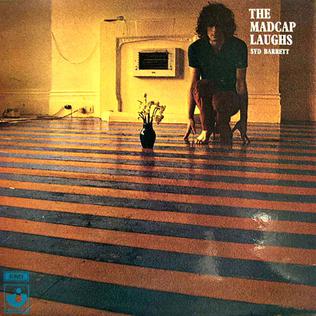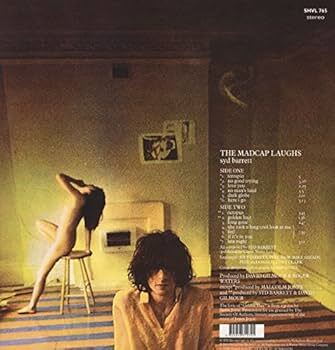A Madcap England Introduction to The Madcap Laughs
When we launched Madcap England back in 2007, the mission was simple; create affordable menswear inspired by the sharp silhouettes, bold patterns and free-spirited attitude of the 1960s and 1970s, then give it all a fresh, modern Indie twist. But every fashion label needs a name, and ours came from a place of pure cultural admiration; the 1970 Syd Barrett solo album The Madcap Laughs, an off-kilter psychedelic folk classic that remains one of the era’s most intriguingly eccentric records. It even earned a place in Mojo’s 2003 list of the “Top 50 Eccentric Albums of All Time”, though it still too often slips beneath the radar.
We’ve always believed this remarkable record deserves more ears. So, in true Madcap England spirit, here is our expanded guide to The Madcap Laughs; a story of creativity, fragility, and undimmed brilliance.
From Underground Visionary to Reluctant Icon
Before his solo years, Syd Barrett was at the heart of a rapidly shifting cultural moment. As a founding member of the legendary rock group Pink Floyd, he led the band through its early breakthrough, an explosion of surreal lyrics, exploratory soundscapes, and bold artistic ambition. Their 1967 debut "Piper at the Gates of Dawn" remains one of the great psychedelic albums of all time. Released in August of that year, it followed hot on the heels of the band’s influential residency at London’s countercultural hub, the short-lived but iconic UFO Club, as well as their quirky, quintessentially British singles “Arnold Layne” and “See Emily Play.”
That early success, however, masked a growing strain. Even as the album climbed the charts, the band were forced to cancel their appearance at the prestigious National Jazz and Blues Festival, citing Barrett’s “nervous exhaustion.” Hindsight shows how ominous that moment was. His behaviour on stage became increasingly unpredictable, sometimes brilliant, sometimes unresponsive, sometimes simply absent.
By Christmas 1967, the rest of Pink Floyd reached out to one of Barrett’s old Cambridge friends, Dave Gilmour, inviting him to join as a second guitarist. The hope was not to replace Barrett but to support him; Gilmour would handle the parts Syd could no longer reliably play or sing. But the cracks grew wider. On the way to a gig, someone in the band famously asked, “Shall we pick Syd up?” Another replied, “Let’s not bother.” And just like that, Barrett’s tenure in Pink Floyd quietly but definitively ended.
He officially parted ways with the band in April 1968.

The Fragmented Road to a Solo Album
Freed from the pressures of Pink Floyd, but not from the personal challenges that had begun to engulf him, Barrett stepped tentatively into solo work the following month. The sessions for his debut were as fractured and fragile as the man himself. Across 1969, he recorded sporadically between April and July, with no fewer than five producers attempting to harness flashes of genius from moments that could be unpredictable, disjointed, or unexpectedly luminous.
Gilmour returned, this time not as a bandmate but as a guiding hand behind the desk, and Roger Waters also contributed, both mixing and producing sessions. Together, Barrett and Gilmour sequenced the final track order on 6 October 1969. The album’s lone single, “Octopus,” followed shortly after.
“Octopus”: Whimsy in Full Colour
“Octopus” is pure Barrett; a wondrous kaleidoscope of surreal word-play, English whimsy and brisk psychedelia. It even lifts a line from Rilloby-Rill by the Edwardian poet Sir Henry Newbolt, demonstrating Barrett’s gift for fusing literature with pop melody. With Gilmour playing bass and drums, the track captures something remarkably close to the inventive charm of early Pink Floyd, yet feels unmistakably its own creature.
The title of the album itself comes from a mishearing by Gilmour of a lyric in this song, “the mad cat laughed”, a fortunate accident, because “Mad Cat England” just doesn’t have the same ring to it. This track is also the inspiration behind our own Madcap England logo, making it a personal favourite within our team.
Mick Rock’s Iconic Bedroom Portrait
No discussion of The Madcap Laughs is complete without its unforgettable cover. Shot by legendary photographer Mick Rock, the image captures Barrett barefoot in the striped, hand-painted floorboards of his Wetherby Mansions flat. The orange-and-purple planks are now nearly as iconic as the music itself, an unfiltered glimpse into Barrett’s private world, intimate yet disarmingly stark.
On the album’s back sleeve appears “Iggy the Eskimo”, who, as the story goes, happened to be naked in the kitchen when Rock arrived for the session. The resulting photographs have become part of the album’s mythology; raw, spontaneous, and entirely in keeping with the spirit of the music.

A Lo-Fi Masterpiece Ahead of Its Time
Released in January 1970, The Madcap Laughs reached only number 40 on the UK Albums Chart. Commercially modest, it nonetheless carved out a devoted following. The sound is often sparse, sometimes intentionally so, sometimes simply the result of the recording circumstances. These stripped-back arrangements give the album an emotional immediacy. Nothing is smoothed over; nothing is disguised. You hear the tremor in Barrett’s voice, the asymmetrical rhythms, the moments where fragility becomes a form of artistic strength.
The songwriting, though, is astonishing. Barrett sketches surreal, dreamlike vignettes that explore innocence, imagination, alienation, and memory. Songs drift between the childlike and the cosmic, the humorous and the unsettling, with imagery that feels simultaneously intimate and mythic. Yes, the production can be uneven. Yes, a few tracks stumble. But taken as a whole, the album offers a unique window into a creative mind working at the very edge of conventional structure, an essential document of late-60s experimental rock.
The Briefest of Live Afterlives
Following the album’s release, Barrett made a single solo live appearance at Kensington Olympia. Backed by Gilmour and Jerry Shirley, he performed “Terrapin,” “Gigolo Aunt,” “Effervescing Elephant,” and “Octopus.” Only “Octopus” featured audible vocals, and Barrett abruptly ended the performance before leaving the stage for good. It was a fleeting, fragile epilogue to a career that had reshaped British music in just a few short years.
Why The Madcap Laughs Still Matters
We hope that this introduction inspires you to explore Barrett’s music with fresh ears. The Madcap Laughs isn’t simply a post-Pink-Floyd curiosity. It’s a singular psychedelic experience; strange, charming, unsettling, and ultimately unforgettable. For us at Madcap England, it represents not only an artistic touchstone but a reminder that creativity needn’t be perfect to be profound.



